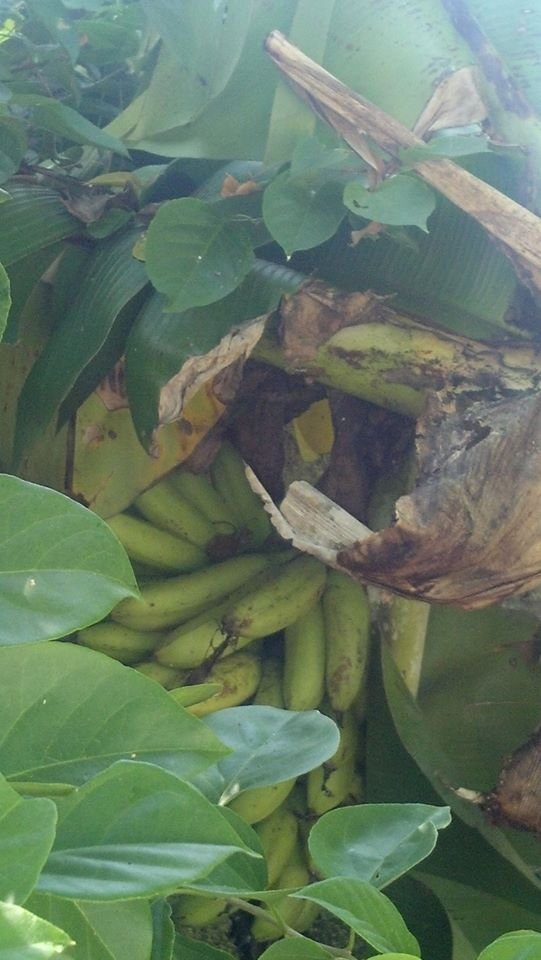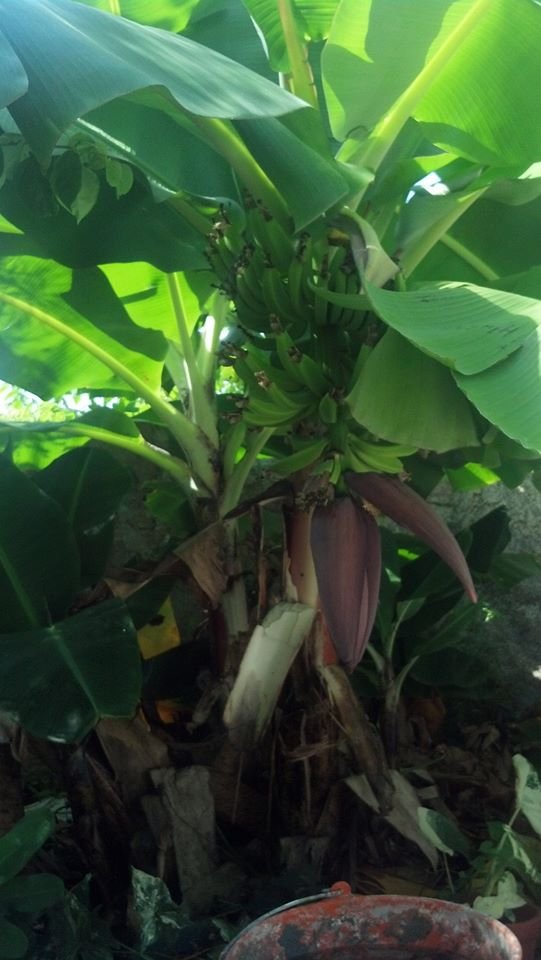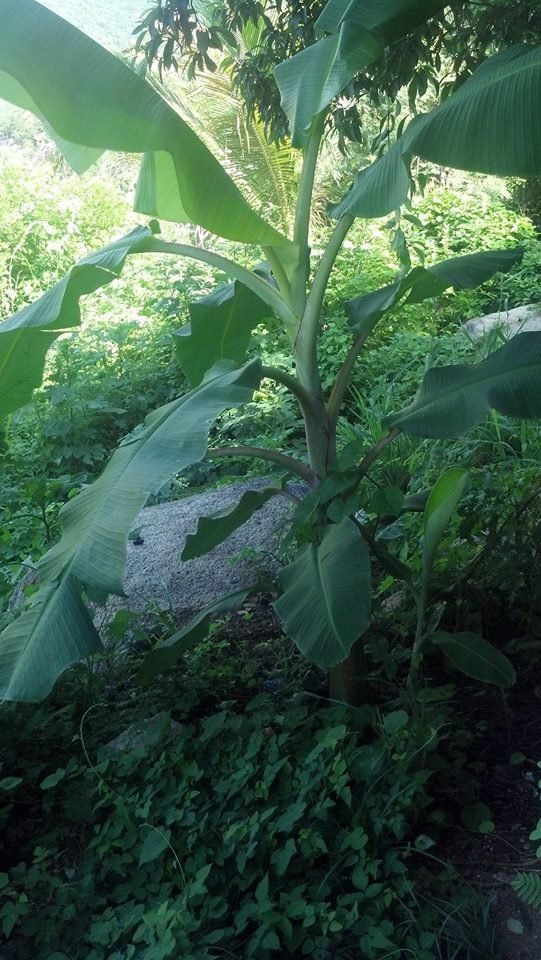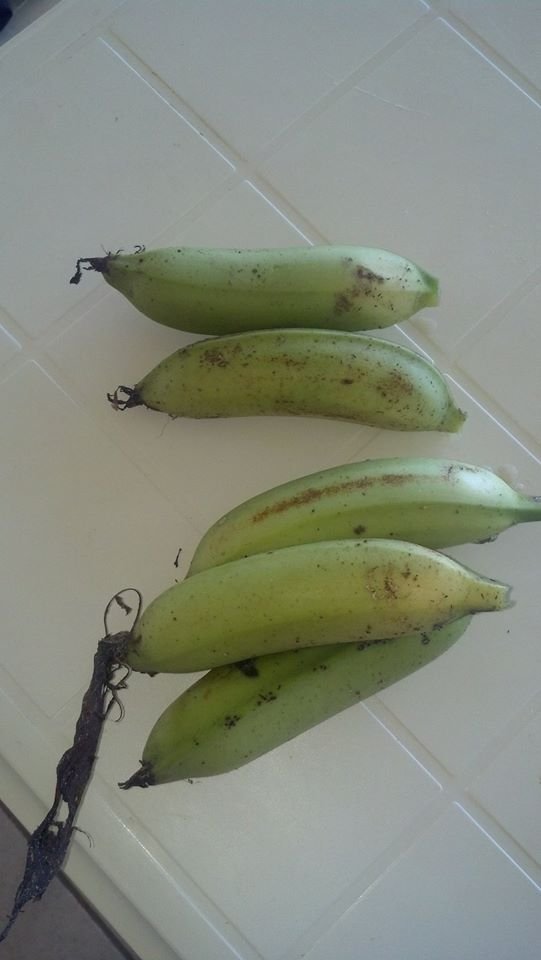
Bananas are arguably one of the most common fruits you see in the grocery store, maybe tied with apples and oranges. Despite it's commonality, most people have no idea how bananas are grown. Before becoming a botanist, I had very little knowledge of the plant, despite my mother having owned banana trees for most of my childhood. In tropical permaculture systems, bananas are an integral part of these systems due to that fact that as long as they are provided their needs, they will produce a crazy amount of food in a short time.

My mother was the "green thumb" in my family growing up, which meant that she had a huge collection of plants, very few of them useful. The majority of my mother's botanical care went into plants like hostas, which are pretty, but useless as anything other than being a fixture in landscaping. My mom didn't grow vegetables or fruits until the end of her life, which didn't do much for her starving children. There were several different tropical plants that she kept in our house, banana trees being one of them. I remember them being funny looking dusty trees that never seemed to grow but also never seemed to die either. She, like many northerners, like to be able to say she had banana trees but did not do anything to make it so she had bananas off those trees.

My brother, the real green thumb in the family other than me, is the only successful banana grower in my family. He took those trees (he may have done this with my mother's trees, or a aunt's or something) and made them produce bananas nearby Cleveland, Ohio. My little brother had a knack for gardening since early age, as my mother grew the useful stuff by the time she was raising him. He kept at it after she died for a few years and put everyone in my family to shame, as many of them claim to be natural gardening types. Of course, they all referred to him as having the magical green thumb. In reality, this trait is learned, not genetic. I started off as a gardener that couldn't keep a mint plant(arguably one of the hardest plants to kill from neglect) alive.

I've wanted to grow bananas for years, generally the thing keeping me from making it happen was how temporary my life situation has been for awhile. I just haven't stayed in a place long enough to justify the effort, which in the north was much harder than the tropics. Like pineapple, growing bananas in the north requires special care. My brother pulled it off by moving the plant outside in direct sun in summer, keeping it watered and fed. When we moved to Mexico, I grew excited at all the locally grown bananas at cheap prices. I had finally landed in the land of bananas and pineapple, two of my favorite fruits. When we moved up the hill, part of the wow factor for our house was it had banana trees on property, with a special nook of the outside area being preserved for banana. The pictures shown so far in the article are of our banana patch, just 10 feet from our door.

When we moved in, our banana trees were not happy. As they were coming out of the dry season here in Acapulco, they were parched and the leaves we weakened and shredded from wind. They had no mulch under them and the soil was dry, something that is a no-no in banana farming. Within days, we had swept a decent layer of mulch over the ground, partially produced by the mulcher that is Rebel Dog. The mulch at this point consists of banana leaves, general leaves and chopped weeds. We started watering a lot immediately and several of the trees immediately started to produce flowers. At this point, we have a huge nearly ripe bunch, with another bunch forming it's flowers.

Bananas love consistently moist nutrient dense soil, but well draining soil. If the soil is too heavy or too wet for a banana tree, they are plagued with stem rot which often kills them. Too dry and the plant is weak and will not produce. It's interesting that bananas like a lot of water, but too much is prone to kill them. Under watering can kill a banana, but they generally just stop growing and focus on survival, which is realistically what my mother's did.
They prefer high sun and low wind conditions, which makes growing them up on this mountain interesting. The bananas close to the house are in a protected nook probably for this reason. In our opinion the nook is a little too overprotective. Especially with wind sensitive plants it's important for the plant to deal with a little wind to build some strength. This is one of the reasons that marijuana growers employ so many fans inside, if those buds never have to stand up to wind, how are they supposed to stand up to the weight of dense indoor buds? The same goes for bananas.

Something I didn't quite realize before moving to Mexico is how many different kinds of bananas there are. Just in stores, they sell 2 different kinds of plantain, regular bananas and these small things called domingoes, or something like that. The small one's are almost double the price(23 pesos a kilo) of the large ones(14 pesos a kilo). It just so happens that our first tree to produce for us is of this variety. Due to their much higher price, we've never gotten these bananas, so this will be our first time trying them. When trying to clean up the banana plant for photos, I discovered that it is infested with large black ants, probably after the crop.

Bananas take a year or two to produce, depending on their level of care. They start off as little shoots coming out of the ground and gain more and more leaves and stem thickness, until they eventually become the tree many can recognize. If they have perfect conditions, within a year they will be producing for you, often several bunches per plant at a time. The banana flowers shown above are different than our others, suggesting it might be closer to a classic banana or a plantain.

This is our healthiest banana plant on the property, with a new banana tree beside it. When we moved in, there was only one tree and it was actually about the size of the smaller tree. We have our dishwater draining nearby so it has constant nutrients and water(be sure to use a biodegradable soap;most are in mexico), two things a banana needs to thrive. The larger one is taller than me, or taller than 5 and a half feet now.
Wild bananas are generally full of seeds, they are almost inedible because of the seed. Banana trees are generally not grown from seed because like apples, they are not true to type. This means that if you plant the seed, there's no telling what would come out and it probably wouldn't be what you want. The varieties we eat are actually mutations chosen for their lack of seed. Banana trees reproduce most effectively by clone. Something interesting to consider is most of the worlds bananas come from one plant, genetically speaking. When they're ready, their root systems send up another shoot a short distance away, genetically identical to the first. Ideally, if you're gardening bananas, you would dig up that baby and transplant it a few feet away at least, to give adequate space for each plant to grow. This banana is partially healthy due to the fact that it isn't quite as protected as the others, so it's had to build up strength from winds on our hill. As a result, its a much sturdier tree.

Commercially speaking, bananas are harvested when they are full size and green. The ones we harvested were off of the plant infested with ants, probably heading for the bananas. It's for this reason that commercial growers bag their bunches early and harvest early as well. If you live in a tame bug climate, that is not in the jungle, you could let your fruit ripen on the plant, although it is generally better to harvest them green. You can harvest the whole bunch, or just a few like we did. More often than not in our neighborhood, we see people harvesting them a few at a time. This allows you to ripen them at staggered times instead of all at once. Eating a whole bunch of ripe bananas in a short time seems a bit intense for my tastes.


I made this banana bread for a client out of some bananas he had going bad in his kitchen. Banana bread is one of the easiest and most common things to do with bananas, just about everyone has had it. My recipe is like many others, but it's still worth sharing. For it you'll need:
2 c all purpose flour
1 t baking powder
1/4 t salt
1 c brown sugar
1/2 c melted butter
1 t vanilla
2 eggs
3 overripe bananas
The recipe is simple, you melt the butter and combine all the ingredients in a bowl. After that you bake in a buttered bread pan, or similar sized pan at about 350 degrees for 20-30 minutes. You'll know the bread is done when it's golden brown around the edges and a fork inserted in the center comes out clean. Albeit hot, the bread is ready to eat when you take it out of the oven. It's best served warm with butter.
I loved having banana trees in my yard here in Panama. This house does not have any but we used to fry them up.
Here is a shot from my old tree.
Downvoting a post can decrease pending rewards and make it less visible. Common reasons:
Submit
That's a really nice story about bananas in your life. I'm glad you will be able to enjoy one of your favorite fruits, in abundance. Plants are so interesting, once we get more familiar with them. Have you been using banana leaves for cooking much? At least, you will never be without a plate to eat on, with their big leaves. : )
Downvoting a post can decrease pending rewards and make it less visible. Common reasons:
Submit
reminds me of an old joke... "Time flies like an arrow. Fruit flies like a banana." ;)
Downvoting a post can decrease pending rewards and make it less visible. Common reasons:
Submit
Lovely post. Thank you for a wealth of information about bananas.
Downvoting a post can decrease pending rewards and make it less visible. Common reasons:
Submit
Excellent job!
I've never cared so much about bananas before.
I got deported from Acapulco in '13.
I'll be back along the Cuatemhoc soon, I hope.
Downvoting a post can decrease pending rewards and make it less visible. Common reasons:
Submit
How do you get deported from Acapulco??
Downvoting a post can decrease pending rewards and make it less visible. Common reasons:
Submit
I ran out of money and was selling water on the Farallon near the Pemex station and la migra swooped in on me in a van and took me away.
I had a tourist visa but it expired and I wasn't selling English classes very well.
I didn't have enough Spanish to make friends easily, or a working visa to get a real job.
I should add that I have long hair, tattoos, and a goatee, so that probably had something to do with it, tambien.
Some rich do gooder likely complained about cleaning up the streets.
My dad had died and I needed to come back anyway.
I'll be back down there in time, maybe by the first freeze this year, with any luck.
Downvoting a post can decrease pending rewards and make it less visible. Common reasons:
Submit
“a huge collection of plants, very few of them useful”
Yup, that was my dad too.
Upvoted out of fascination even though I hate bananas!
Downvoting a post can decrease pending rewards and make it less visible. Common reasons:
Submit
Yum. I upvoted you for a total of 0.02 gain. woohoo!
Downvoting a post can decrease pending rewards and make it less visible. Common reasons:
Submit
I think they're called "plátanos dominicanos", or Dominican plantains.
Downvoting a post can decrease pending rewards and make it less visible. Common reasons:
Submit
Really neat post, I've never actually looked at images of a banana tree before!
Downvoting a post can decrease pending rewards and make it less visible. Common reasons:
Submit
I got them infront of my window as well :)
Downvoting a post can decrease pending rewards and make it less visible. Common reasons:
Submit